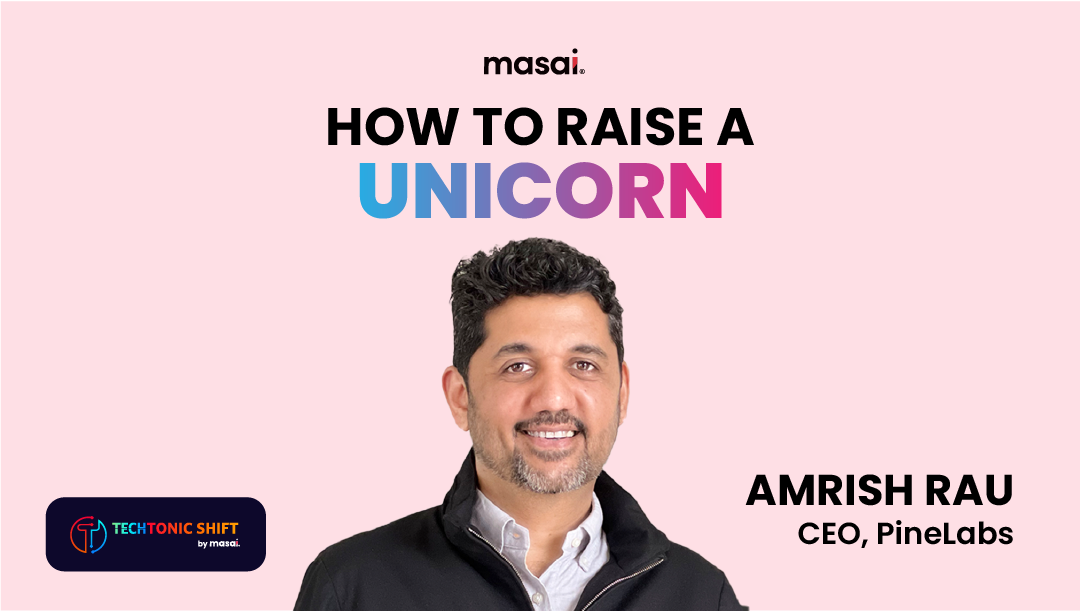Building Unicorns with Amrish Rau, CEO at Pine Labs
Amrish Rau, CEO of Pine Labs talks about Building Unicorns at Techtonic Shift, an event by Masai

Our first guest for our mega event - “Techtonic Shift” was Mr Amrish Rau who is perhaps one of the biggest names in the Fintech Industry, and also one of the key investors in Masai.
Amrish has played a key role in building 2 Unicorns in the Fintech space - Pine Labs, and PayU, and in this article, we learn about his thoughts on building startups and taking them to become unicorns.
How did you go from being a Sales manager to building Unicorns?
Right from my childhood, I remember being confident, and comfortable with my own thoughts. Being active in sports further allowed me to develop confidence, and that backed by my ambition to do big things in life has undoubtedly paved the way for me to grow faster in my career.
I’ve been impatient with learning, and my ability to ask questions and learn like a sponge definitely helped me transform from an employee to a leader, and an entrepreneur.
How did you go about building 2 unicorns?
Success for me has been an amalgamation of the simplest things in life - From writing down everything that needed to get done to always being proactive in completing them, I’ve focused on building little habits.
- Delivering value & creating impact come first
- High level of self-confidence
- Comfortable in my own thinking process
- Wanting to build something
- Big ambitions
- Extremely impatient to learn
- Learning like a sponge, from my seniors, and juniors - Keenly observing and constantly learning
- Delivering value & creating impact come first: This means that the focus is on creating products or services that genuinely benefit and make a difference in the lives of customers. Rather than just pursuing profit, the priority is delivering real value and positively impacting society or the industry.
- High level of self-confidence: Building unicorns demands unwavering self-confidence. It's about believing in your abilities, vision, and capacity to overcome obstacles and setbacks. Confidence is crucial when facing the numerous challenges that come with entrepreneurship.
- Big ambitions: Building unicorns requires thinking big. It's about setting audacious goals and having the determination to pursue them relentlessly. Big ambitions are the driving force behind the growth and scale of these companies.
- Extremely impatient to learn implies a strong thirst for knowledge and a sense of urgency in acquiring new skills and insights. In the fast-paced world of startups, continuous learning is essential for adapting to changing circumstances and staying competitive.Learning like a sponge from my seniors and juniors - Keenly observing and constantly learning: Successful entrepreneurs are lifelong learners. They not only learn from their own experiences but also from the wisdom of mentors and the fresh perspectives of younger team members. They are open to feedback, insights, and lessons from all levels of the organisation.
I believe success for me is a result of these little habits compounding to yield lifelong dividends.
Finding a Co-Founder
The relationship between Co-Founders is unique, and finding a Co-Founder can be tough, especially a Co-Founder who can complement your skills. Being able to establish a working relationship with them can get even tougher.
There are times when you need to deliver some tough news to the other person, and one should be comfortable with the idea of having difficult conversations. While building a company - It’s very important to have the right team.
Non-Negotiables while running a Business
3 absolutely important things that I look for in a business are -
- Tech First company - No matter who you are - A writer, or a strategist - You need to understand tech, and stay close to it. This doesn’t mean that you should be able to code, but
- Employee First - I often tell the people that join him to give him 4 years of their careers, and I will provide them with the space, and the freedom to express themselves, and learn that will help them in their holistic growth.
- No debate about the Market demand - I believe in solving for today where consumers are demanding solutions to be delivered today. I may not be able to pioneer a Tesla or a SpaceX, but strongly believe that there are 1000s of problems to be solved in the present.
Three fundamental criteria I consider indispensable when evaluating a business venture are:
Tech-First Approach: No matter your position within the company, whether a writer, strategist or any other role, a profound comprehension of technology is indispensable. It doesn't require coding skills, but it does mandate a familiarity with technology and a dedication to remaining closely attuned to its advancements. In the contemporary digital era, technology serves as the foundation for virtually all facets of business, spanning from operational functions to marketing strategies. Cultivating tech-savviness guarantees your ability to adjust to the ever-changing landscape and leverage technology as a potent instrument for fostering innovation and enhancing efficiency.
Employee-Centric Culture: Fostering a culture where employees feel valued and empowered is paramount in building a successful business, as it requires a collaborative effort. To new team members, I frequently emphasise a mutual commitment. If they dedicate four years of their careers to the company, I reciprocate by ensuring an environment that promotes self-expression and personal growth. This approach recognises that employees are not just assets but integral partners in the company's journey. By affording them space and the freedom to learn and innovate, their holistic development becomes an investment that ultimately fuels the company's success.
Market Demand as a Guiding Force: In the realm of entrepreneurship, there's no room for debate when it comes to market demand. I firmly adhere to the principle of addressing current consumer needs and desires. While I may not aspire to pioneer groundbreaking ventures on the scale of Tesla or SpaceX, I firmly believe that many pressing problems in today's world demand practical solutions. We can ensure relevance and viability by focusing on addressing these immediate market demands. Innovation thrives when it meets the real-world needs of consumers, and this approach allows us to drive impactful change in the present.
“Companies start with JOSH, but become large companies with HOSH”.
I believe that companies that become successful, are the ones who move from emotions, and passion to processes and structure.
Future of Fintech in India
Fintechs largely operate in 5 key areas -
- Deposits
- Distribution of Credit
- Remittance
- Payments
- Insurance & Wealth tech
Now if you look closely, banks like SBI, HDFC and others also operate majorly in these 5 segments. Now, Fintechs are really good at compartmentalising these services and offering them to the consumers directly with little or no hindrance in access.
One of the most prominent examples would be access to Micro Loans. Companies like LazyPay, Simpl, and others have revolutionized access to microloans, and if you look closely Fintechs are slowly eating away market share from the banks.
In the next few years, we will see Fintechs further tunnel down into taking components out of the banking systems and offering them to consumers, and this rapid change will be relevant for the foreseeable future.
Fintech is a great place to be in for the next 30-40 years. Taking the Indian landscape as an example, I think - “In India, efficiency and improvement in current processes will bring about phenomenal change.”
Simple examples are - UPI and e-KYC, both of these processes have allowed Indians to optimise on time. Before UPI, moving money would take days, and today you can transfer money instantly. e-KYC has enabled financial institutions to act fast allowing the consumers access to a foray of services.
What got you to invest in Masai?
“It was the passion with which Prateek and team had for education. That passion preceded their Prateek’s drive for building Masai”.
When founders are passionate about the problem they are solving, the investors don’t need to drive them, their mission drives them.
What is your advice for our readers?
Three things - Be impatient in your actions, Keep learning, and most importantly - build skills, and develop expertise in a domain.
Example - A software engineer who is just good at what he/she does is one thing, however, an engineer who understands the EV market, or the Fintech market will have an edge, because that understanding of the domain would allow them to perform better.
Another important thing is to understand - What you do in your career should come second, your first should be something else. - It could be your family, your country, or leisure interests like sports, or community service.
For example - I invested in Masai looking at Prateek’s passion for Education first, and then Masai. That passion to better the current state of the Education system preceded the desire to build a company and that gives Founders an edge over others.

